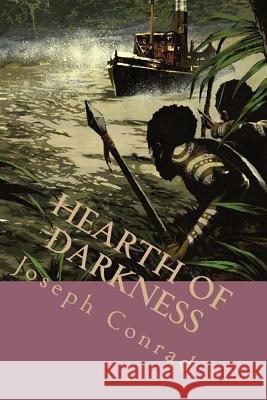Hearth of darkness » książka
Hearth of darkness
ISBN-13: 9781539915492 / Angielski / Miękka / 2016 / 146 str.
A group of men are aboard an English ship that is sitting on the Thames. The group includes a Lawyer, an Accountant, a Company Director/Captain, and a man without a specific profession who is named Marlow. The narrator appears to be another unnamed guest on the ship. While they are loitering about, waiting for the wind to pick up so that they might resume their voyage, Marlow begins to speak about London and Europe as some of the darkest places on earth. The narrator and other guests do not seem to regard him with much respect. Marlow is a stationary man, very unusual for a seaman. The others do not understand him because he does not fit into a neat category in the same manner that the others do. He mentions colonization and says that carving the earth into prizes or pieces is not something to examine too closely because it is an atrocity. He then begins to narrate a personal experience in Africa, which led him to become a freshwater sailor and gave him a terrible glimpse of colonization. With the exception of two or three small paragraphs, the perspective shifts to Marlow, who becomes the main narrator for the rest of the novel. Marlow has always had a passion for travel and exploration. Maps are an obsession of his. Marlow decides he wants nothing more than to be the skipper of a steamship that travels up and down a river in Africa. His aunt has a connection in the Administration Department of a seafaring and exploration company that gathers ivory, and she manages to get Marlow an appointment. He replaces a captain who was killed in a skirmish with the natives. When Marlow arrives at the company office, the atmosphere is extremely dim and foreboding. He feels as if everyone is looking at him pityingly. The doctor who performs his physical asks if there is a history of insanity in Marlow's family. He tells Marlow that nothing could persuade him to join the Company down in the Congo. This puzzles Marlow, but he does not think much of it. The next day he embarks on a one-month journey to the primary Company station. The African shores that he observes look anything but welcoming. They are dark and rather desolate, in spite of the flurry of human activity around them. When he arrives, Marlow learns that a company member recently committed suicide..... Joseph Conrad, pseudonyme de Teodor Jozef Konrad Korzeniowski herb. Na ecz, est ne le 3 decembre 1857 a Berditchev (Ukraine - Empire russe) et mort le 3 aout 1924 a Bishopsbourne (Kent - Angleterre). D'origine polonaise, il est un ecrivain de langue anglaise majeur du XXesiecle. literary career Now dedicated to his literary work, Conrad completes Almayer's Folly which appeared in April 1895, wrote a pariah islands published in April 1896. Desperate to regain command, he wrote to a friend "I only have that literature as a means existence "and clearly states write for money ... the same year, he married Jessie George and stays in Britain from March to September - life is cheaper to Lannion Island Great in London - and there wrote some of his texts. Back in England, he moved to Stanford-le-Hope, Essex, and in March 1897, Ivy Walls, Essex (publication of the Negro Narcisse). His son Boris born in 1898 (publication of the story collection Worry), and in October, Conrad family facility at Pent Farm, Kent, house rented by the writer Ford Madox Ford. In August 1906, after the birth of the second son, John, the Conrad guests to Montpellier, then in Geneva. It publishes the Mirror of the Sea."
Zawartość książki może nie spełniać oczekiwań – reklamacje nie obejmują treści, która mogła nie być redakcyjnie ani merytorycznie opracowana.











